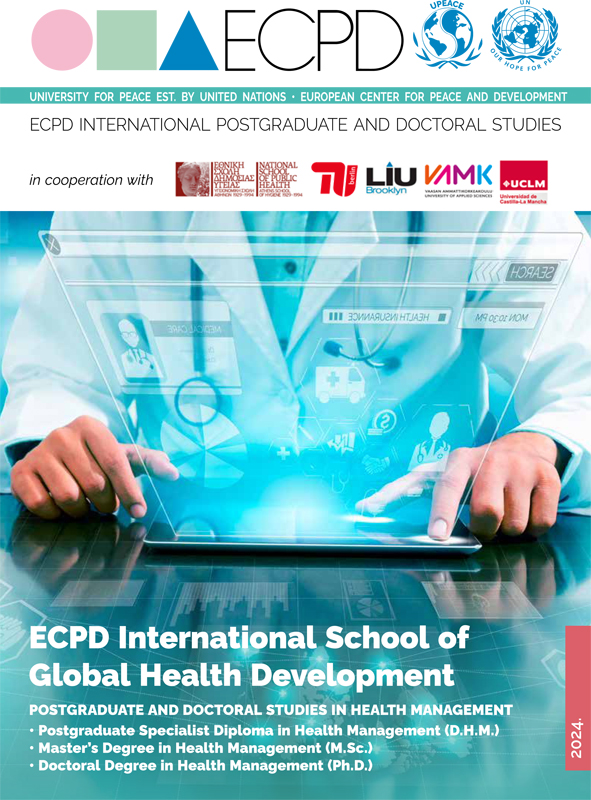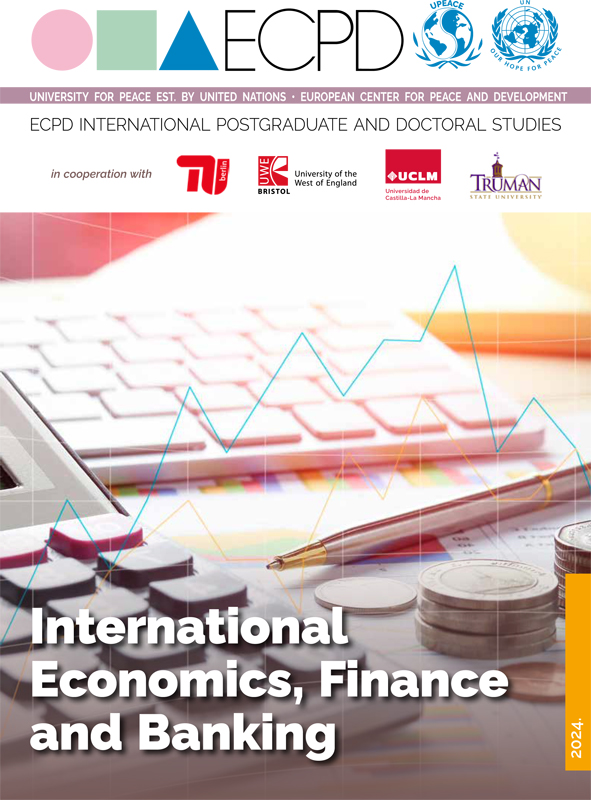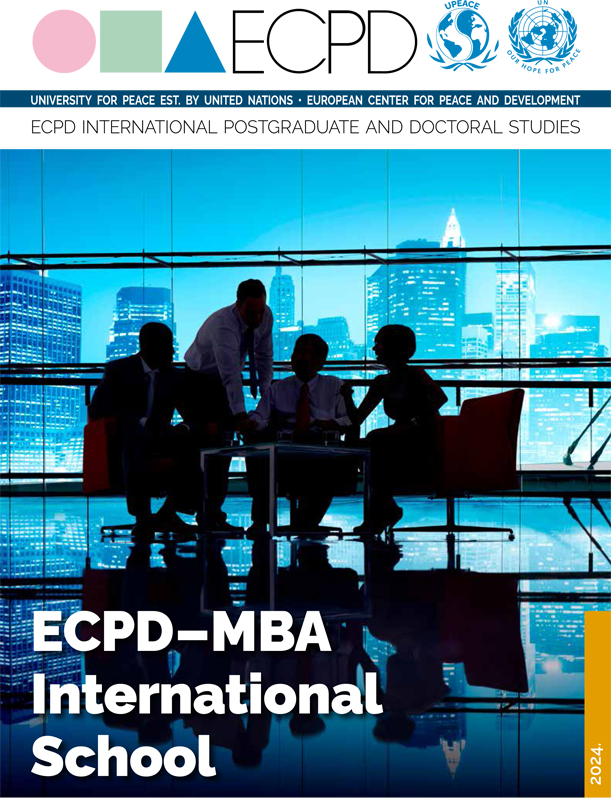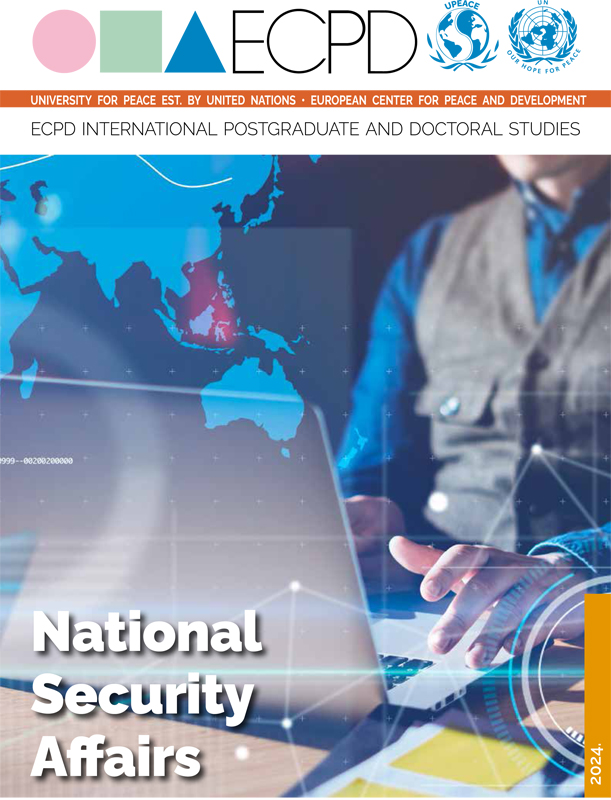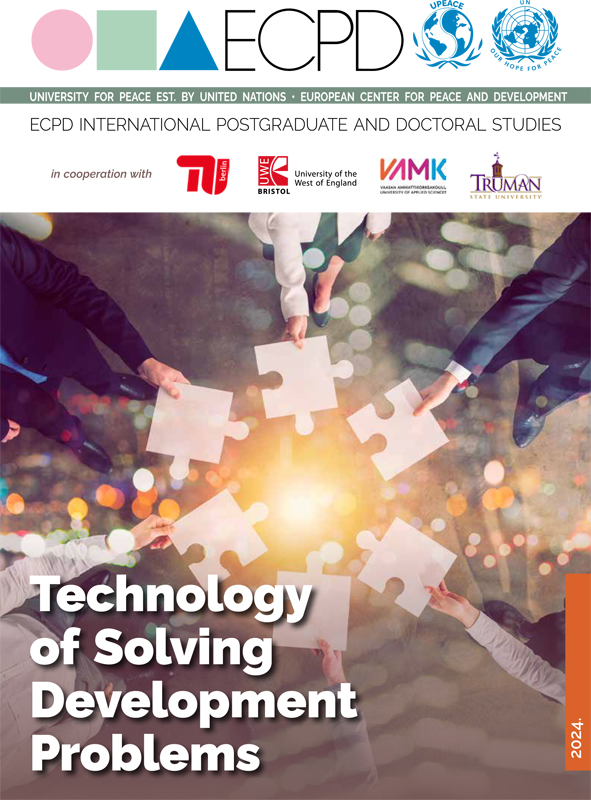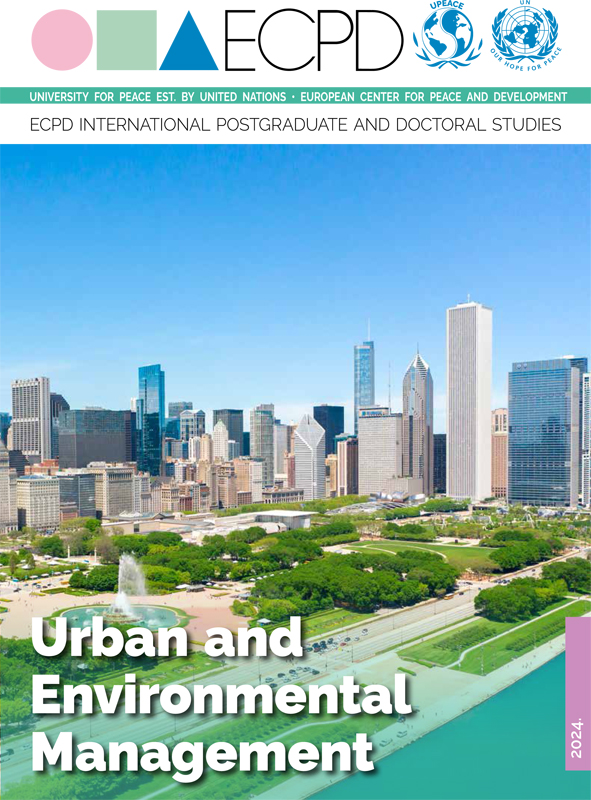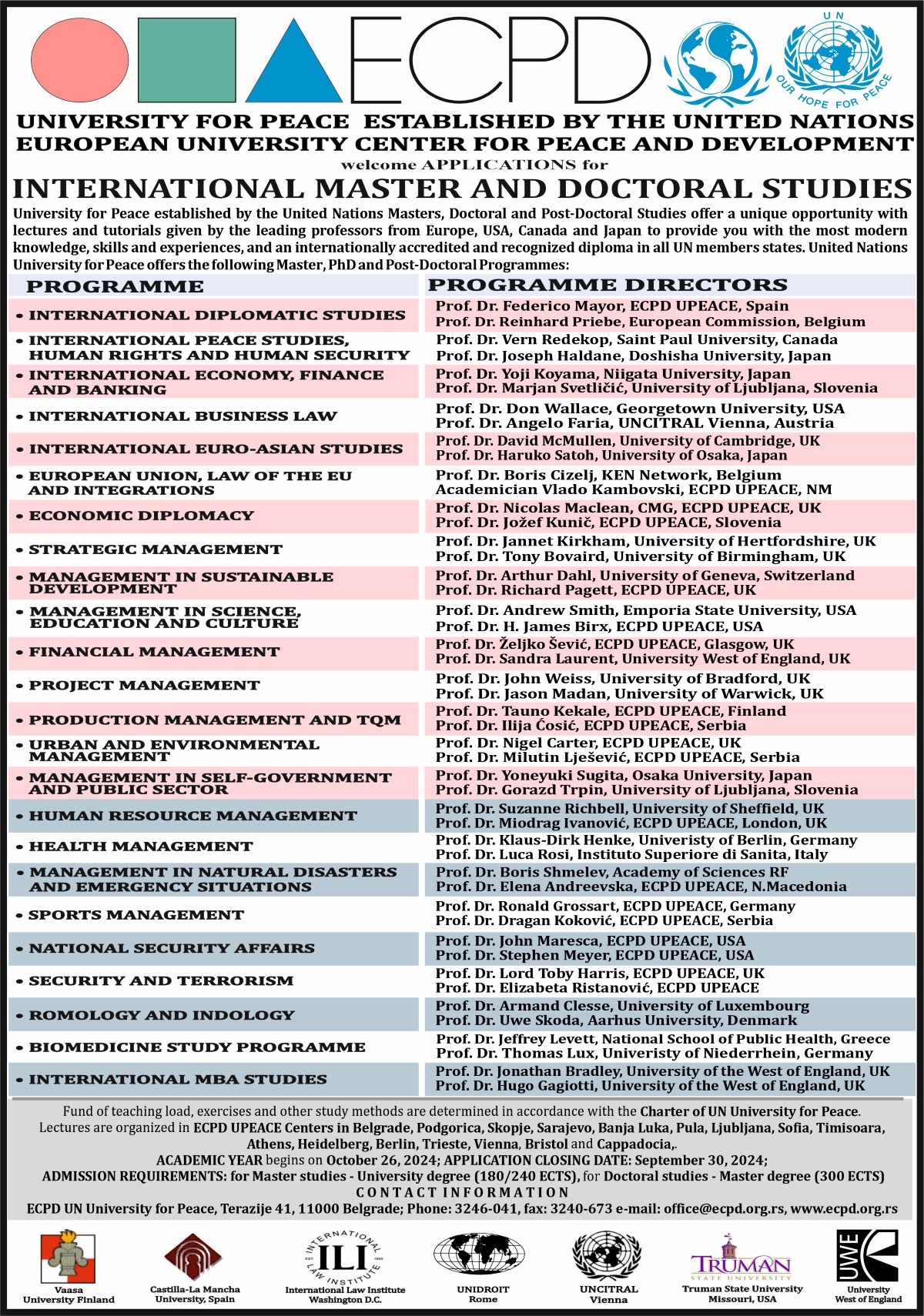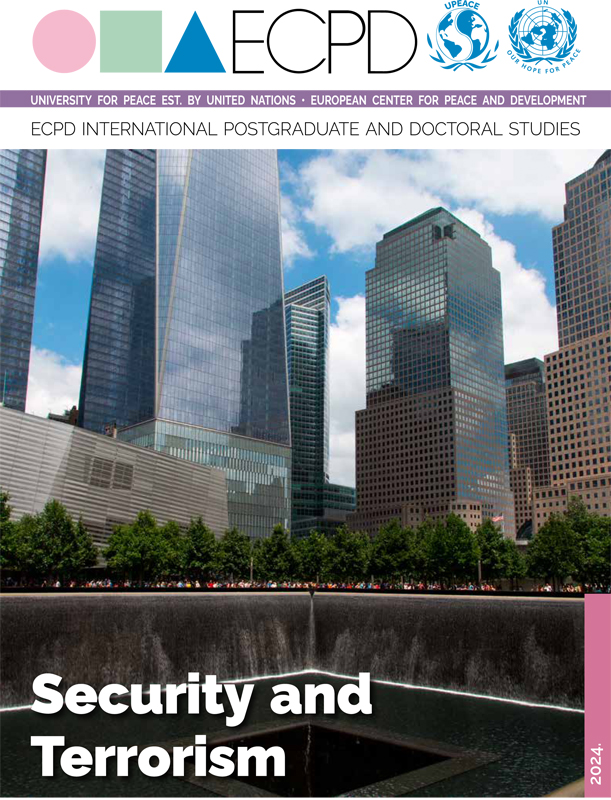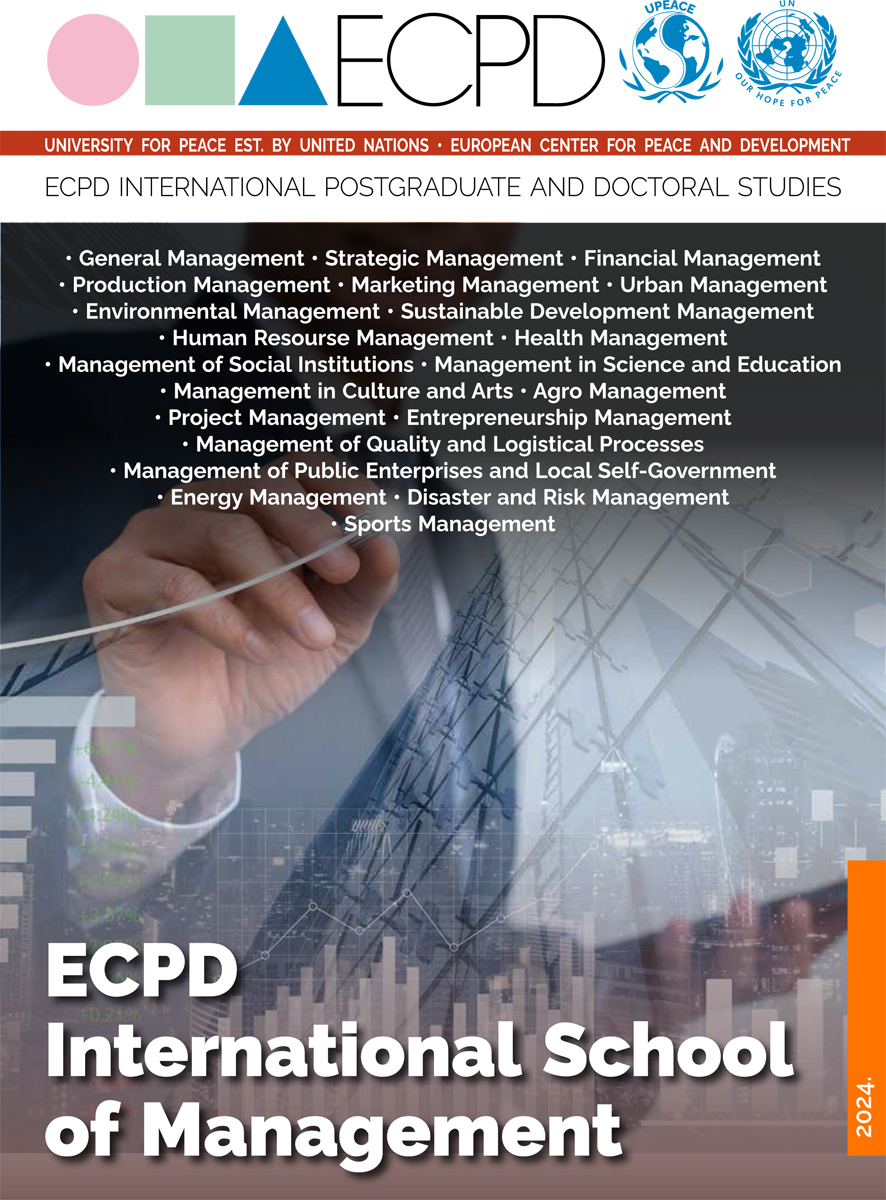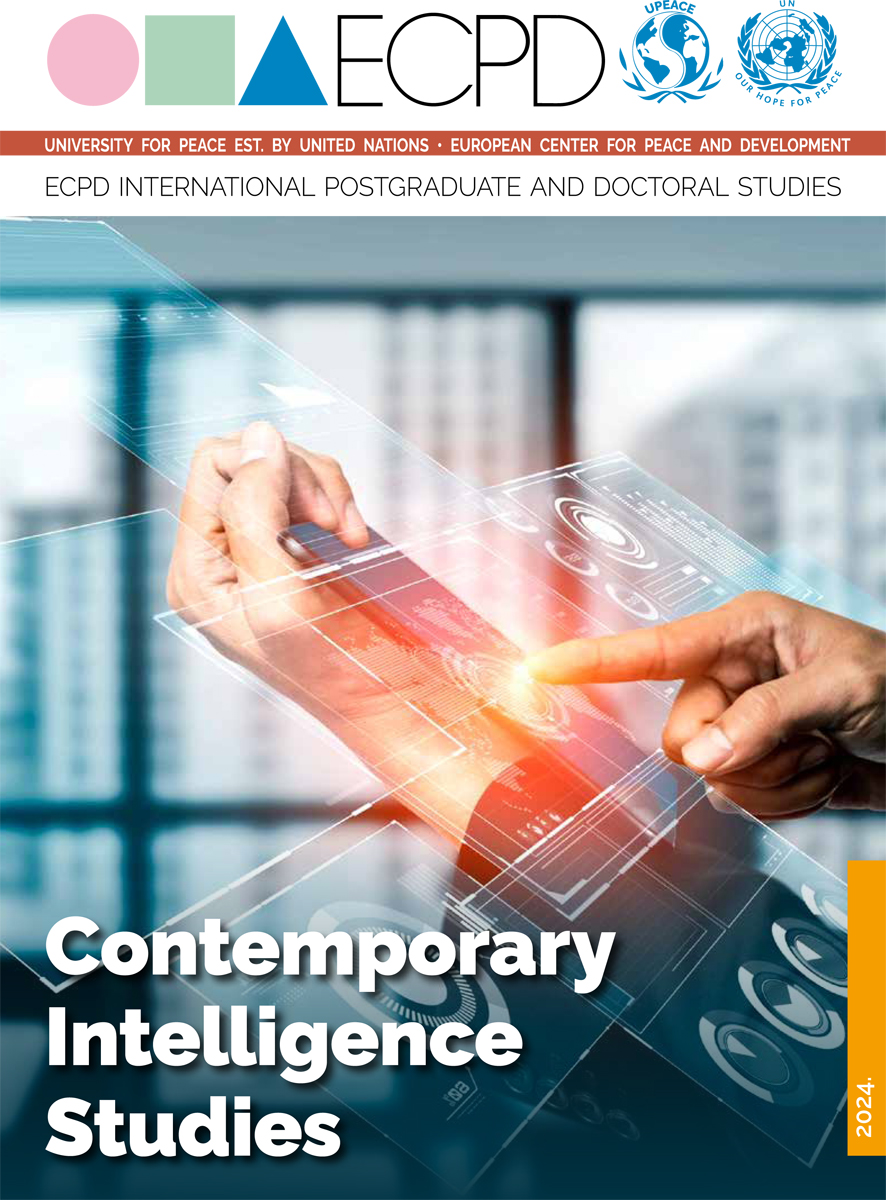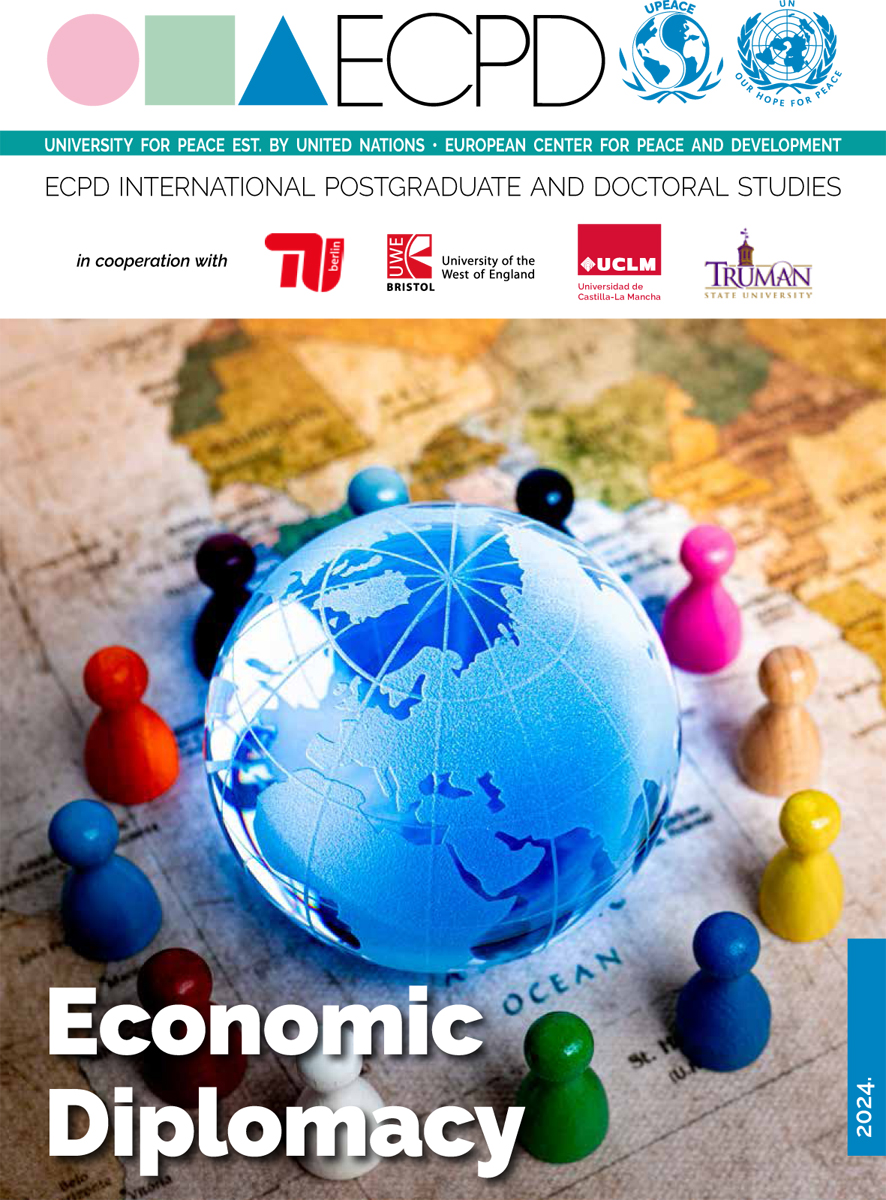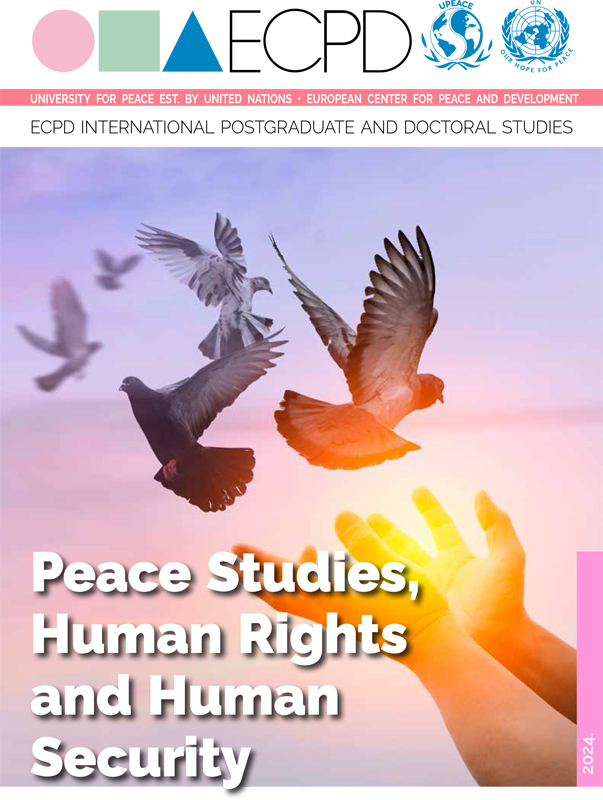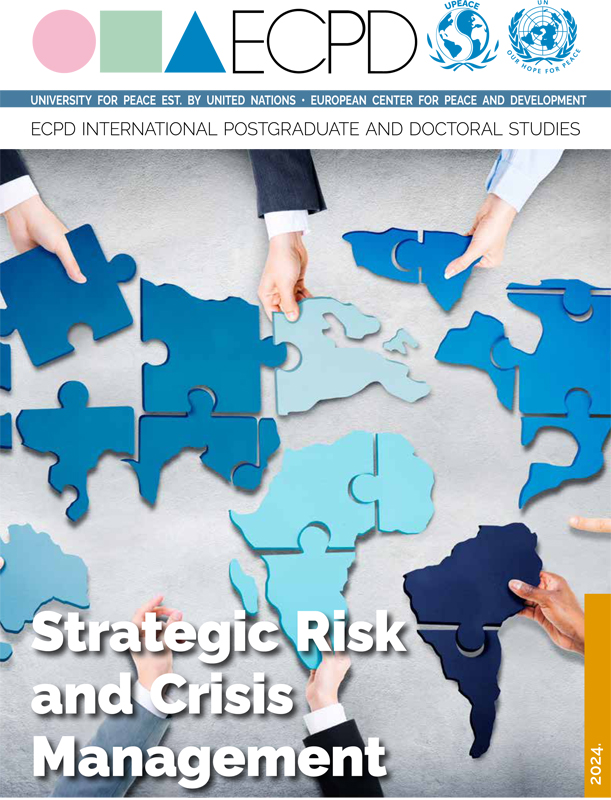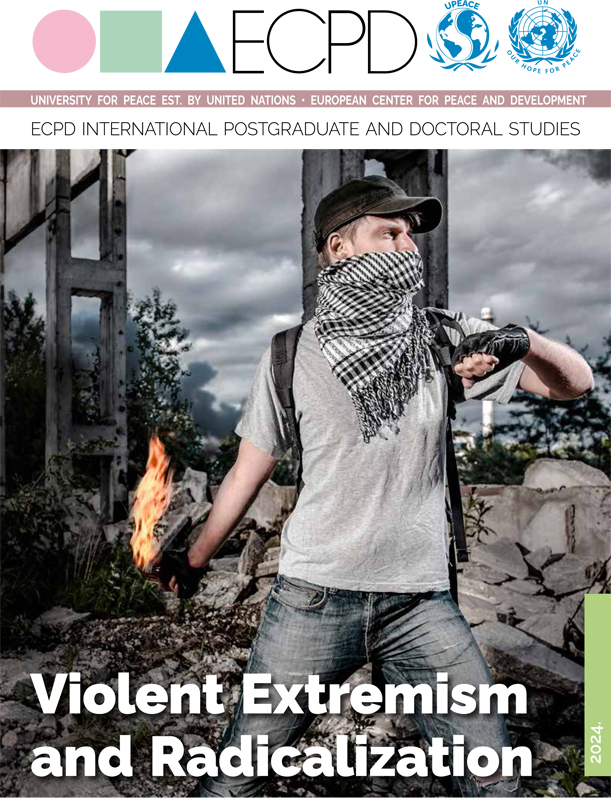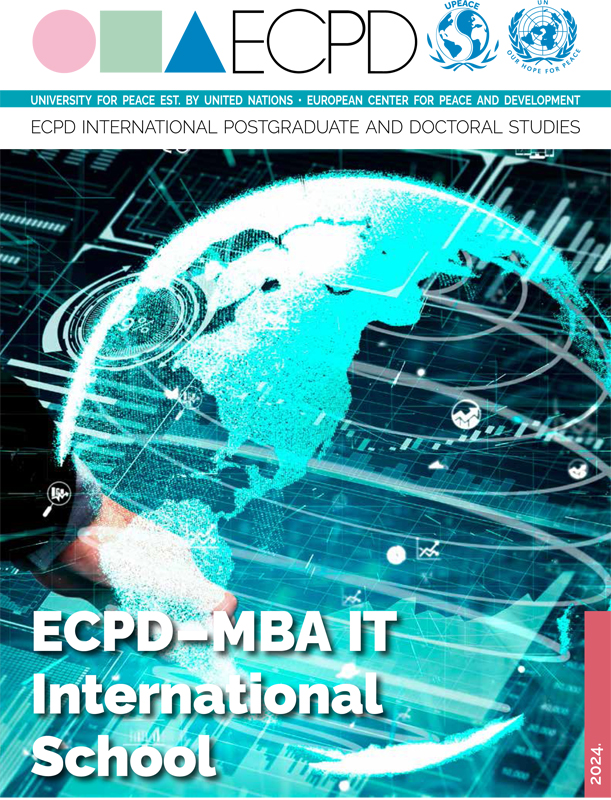The European Center for Peace and Development (ECPD) in cooperation with the University of the West England, UK; VAASA University, Finland; Svovenian Business and Research Association, ARSBL, Brussels; Eurpe Matters, ASBL, Brussels, and Atlantic Affairs Institute, ASBL, Brussels, developend and proposed to the Government of Montenegro elaboration of the afore mentioned project.
This initiatiove was based upon the ECPD estimate that inclusion of Montenegro as a relatively new democratic country into Euro-Atlantic integrations (European Union and naorthatlantic Organization Treaty - NATO) is of great interest not only for herself, her development in peace and securiy but of interest her other neihbering countries and the South-Western Balkan's sub-region in general.
The project should be realized, as anticipated, in the period of 2008 - 2010, and in that respact a preliminary agreement has been reched.
Commissioner: Ministry of Development, Science and Environment of the Government of the FR of Yugoslavia, Belgrade
Project Director: Prof. Dr.sci Dragoslav Avramović
Project Council: Dragoslav Avramović, Shinichi Ichimura, Mircea Malitza, Tričković Vidosav, Vendy Jacque
The sanctions against the FR of Yugoslavia (FRY) were introduced by the UN Security Council (SC) resolutions 713 (1991), 787 (1992) and 820 (1993). The reason for their adoption was the conviction of the SC members that FRY failed to observe SC requests to stop its military engagement in Bosnia and Herzegovina (BiH) conflict, which was regarded by all SC members as a 'threat to international peace'. There were some disputed among the authors and independent observers whether the reason and the method of their implementation were legally and humanly justified.
However, regardless of divided opinions on the passing and implementation of the sanctions, there was unanimity that they most severely hit innocent citizens (especially the old, sick and children) who should not be regarded as responsible for the policy of their government. The measures of the total embargo on science and culture, economic and social development, demographic movement and other determinants of development of a society were more counter-productive than contributively to the achievement of a desired goal confirmed the authors. They at the same time caused great damage to the economies of neighbouring countries particularly thought increasing 'black market', drug trafficking and organized crime.
Countered by intensive internal propaganda launched through electronic and press media, the sanctions practically contributed to strengthening nationalistic feelings not only among politicians but among peoples as well; they deepened animosity of the peoples against initiators and executers of them. They, countered by thoughtfully organized propaganda, made rich richer and more inflation, while poor poorer and weaker in trying to make a modern society.
The sanctions, as the rule, benefited to the political elite and those who advocated it, making them richer and more inflation, while the base of the population was seriously detoriated. As far as the base of the population was concerned, the authors concluded that they 'had an adverse effect on natural population movement and, due to increased mortality, coupled with decreased birth rate, endangered the biological integrity of the population'. This should be added that intensified migration especially young and educated people seriously endangered demographic growth, economic and technological development of the targeted country.
The Project was completed and delivered to the commissioner in December 1996. In 1997 it was published as a separate book, in Serbian with SUMMARY in English. The ECPD elaborated also a sub-study 'The Impact of Sanctions upon the Economy and Society of the Republic of Montenegro.
The European Center for Peace and Development was actively engaged in the elaboration of research projects and studies relating to the problems of the country's economic development. The major projects of this kind were carried out as follows:
The Federate Fund for Crediting Economically Underdeveloped Republics and Provinces, 1965 – 1990
Project Client:
The Federation fund for Crediting the Underdeveloped Republics and Provinces of Yugoslavia.
Project Director:
Branislav Čolanović, Prof. Dr. sci.
Associate authors:
Prof. Dr Dragoslav Avramović
Prof. Dr Spasoje Medenica
Academician Prof. Dr Vladimir Stipetić
Prof. Dr Šefer Berislav
Year of elaboration: 1991
The researchers lead by Prof. Dr Dragoslav Avramović analyzed the levels of economic development of all Yugoslav republics and autonomy provinces, as well as the legal basis and purpose of the Fund established in 1965. Through the mediation of the Fund, they concluded that financial assistance for development was provided to the underdeveloped republics and province of Kosovo. In other words, the resources provided by the Fund formed part of overall investments of the Republics of Bosnia and Herzegovina - 12.5%, Montenegro - 20.3%, Macedonia - 22.9% and the Province of Kosovo even - 64.1%.
They concluded that the efficiency of investments was not satisfactory and was on a decrease. But this was the case with the Yugoslav economy in general. The Fund actually shared the faith of the existing economic and social system, which finally proved to be increasingly inefficient and finally collapsed. The authors also recomended economic reform and its substance.
Reintegration of Returned Emigrants and the Employment of Refugees and Displaced Persons
The Project Commissioner:
Ministry for Development, Science and Environment, Government of the FR of Yugoslavia,
Project Director:
Prof. Dr Branislav Čolanović
Consultants:
Momčilo Cemović
Prof. Dr Berislav Šefer
Dr Luka Todorović
Associate:
Svetislav Božinović
Year of elaboration: 1997
Addressing the extremely complex social and economic issue of reintegration of returnees, employment of refugees and displaced persons, as concluded by the researchers, was only one part of the actions taken with the view to overcome the acute problem of unemployment in general in the FR of Yugoslavia. It was also concluded that the process of reintegration of returned emigrants and the employment of refugees and displaced persons cannot be resolved separately; rather it must form part of the far-reaching strategy of the country's development and addressed within the scope of the increasing employment in general.
Experiences of the Council of Europe Fund for Social Development in Financing the Reintegration of Refugees and Other Social Cases
Project Client:
Ministry for Development, Science and Environment, Government of the FR of Yugoslavia,
Supported by:
Fund for Social Development, Council of Europe
Project Director:
Prof. Dr Branislav Čolanović
Year of elaboration: 1997
The main tasks and objectives of this project were to identify and point out at the dimensions of the problem which the FR of Yugoslavia and numerous other European countries were facing with in an attemptto solve the problem of reintegration and employment of refugees, as well as the potential financial sources needed for the implementation of the programmes dealing with the reintegration and employment of refugees and displaced persons.
The researchers concluded that the reintegration and employment of the refugees was only a part of the actions to be taken in order to overcome the problem of unemployment and recommended that it should be incorporated into the overall plan and programme of the country's economic and social development. They also concluded that the process of efficient reintegration and the unemployment problem require international support and financial assistance.
Impact of the International Sanctions on the Economy and Society of the FR of Yugoslavia in the International Perspective
Project Client:
Ministry for Development, Science and Environment, Government of the FR of Yugoslavia,
Project Director:
Prof. Dr Dragoslav Avramović
Governor of the National Bank of the FR of Yugoslavia
The Project International Council:
Prof. Dr Dragoslav Avramović
Prof. Dr Ichimura Shinichi
Prof. Dr Malica Mircea
Prof. Dr Vidosav Tričković
Prof. Dr Vendy Jacques
Prof. Dr Henry Paul-Mark
Prof. Dr Scott Norman
Year of elaboration: 1996
The sanctions against the FR of Yugoslavia (FRY) were introduced by the UN Security Council (SC) by its Resolutions 713 (1991), 787 (1992) and 820 (1993). The reason for their adoption was the opinion of the SC members that the FRY failed to observe the SC requests to stop its military engagement in the conflict in Bosnia and Herzegovina (B&H), which was regarded by all SC members as a 'threat to international peace'. There were some disputes among the authors and independent observers whether the reason and the method of their implementation were legally and humanly justified.
However, regardless of the divided opinions on the imposition of sanctions, there was unanimity that they most severely hurt innocent citizens (especially eldery and sick people and children) who should not be held as responsible for the policy of their government. The total embargo on science and culture, economic and social development, demographic movement and other determinants of development of society were counter-productive and could not contribute to the achievement of the desired goal, as was confirmed the authors. Aat the same time, they caused great damage to the economies of the neighbouring countries, particularly through a growing 'black market', drug trafficking and organized crime.
Countered by intensive internal propaganda, launched thought electronic and press media, the sanctions practically contributed to the strengthening of nationalist feelings not only among politicians but also among people; they deepened animosity of the people toward those who had imposed them. Countered by thoughtfully organized propaganda, they made the rich richer and more influential, while the poor became poorer and weaker in an attempt to create modern society.
As a rule the sanctions benefited the political elite and those who advocated them, making them richer and more influential, while the base of the population seriously detoriated. As far as the base of the population was concerned, the authors concluded that they 'had an adverse effect on the natural population movement and, due to a rise in mortality, coupled with the decreased birth rate, endangered the biological integrity of the population'. Moreover, the intensified migration of young and educated people seriously endangered demographic growth and economic and technological development of the targetted country.
The Project was elaborated by more than 25 prominent scientists, researchers and experts from the FR of Yugoslavia and several other countries and international organizations. Below is the list of Project
Redactors:
Dr. Nemanja Božić
Dr. Vidosav Tričković
The Project was completed and delivered to the client in December 1996. In 1997 it was published as a separate book in Serbian with the summary in English. The ECPD also elaborated a substudy 'The Impact of Sanctions on the Economy and Society of the Republic of Montenegro.
The European Center for Peace and Development elaborated several other research projects related to the economic and social development of the Former Yugoslavia, including:
· Development Policy of the Underdeveloped Regions – Classification and Comparative Analyses of the Practice of European and Non-European Countries, 1989;
· The System and Policy of Spurring the Development of Underdeveloped Regions in the SFR of Yugoslavia, 1990;
· The Yugoslav Bank Organization, with a proposal for the adoption of the Law on the 'Yugoslav Development Bank', 1992;
· Damage Caused by the Disintegration of the Former Yugoslavia; Military Operations and the Blockade of Serbia and Montenegro, 1993;
· Reconstruction and Revival of the Economy and Social Activities in the Ex-Yugoslav Republics, 1993.
· Policy of Scientific and Technological Development of the FR of Yugoslavia by 2000, 1996;
· The Center of Excellence (Research into the Justifiability of Establishing and Determining the Conditions and Procedures for the Most Favourable Institutionalization of the Center of Excellence in the FR of Yugoslavia).
In 1997, the European Center for Peace and Development was actively engaged in the research activities aimed at improvingof the leadership in ICN Corporation. The following research projects were carried out:
The Policy and Systems of Training Managers and Specialists in ICN East Europe
Client:
ICN East Europe
Project Director:
Prof. Dr Vlastimir Matejić
This project rallied the experts of specified companies operating within this business system in the United States, Hungary, Russian Federation and Yugoslavia, as well as numerous experts outside the ICN system, to be trained by renowned management experts from various European and non-European countries.
The realized project provided a sound basis for the organization and conduct of additional specialist training of the employed within this business system, especially managers and specialists, but is also of broader use in the pharmaceutical industry.
Reengineering of the Marketing and Sales Functions
Client:
ICN Galenika, Yugoslavia
Project Director:
Prof. Dr Mile Jović
The project was carried outand handed over to the client in two phases:
A) Analysis, and
B) Resume and Recommendations
The Analysis was a result of comprehensive research into the organization and functions of ICN Galenika Company, particularly its Marketing and Sales Division or Sector.
Apart form the Resume of this research, the authors recommended the necessary and possible new organization settings, changes in the methods of work, the way of inquiring and restructuring the labourforce and the like.
Reengineering of the Business Planning, Accounting and Control Sectors of ICN Yugoslavia
Client:
ICN Yugoslavia
Project Co-Directors:
Prof. Dr Gavrilo Jović
Prof. Dr Jovan Ranković
During the period of July – August 1997, the authors, in the process of realizing the project's tasks conducted, a survey of the work of the Planning, Accounting and Auditing Sectors, made interviews and had discussions with numerous leaders – directors, department heads, desk officers and the like. On the basis of their findings, they developed a new of planning concept and recommended the ways and means leading to the improvement of the accounting and control functions.
Danube Pollution Reduction Programme - National Reviews of the Federal Republic of Yugoslavia - 1998
In cooperation with the Federal Ministry for Development, Science and Environment of the FR of Yugoslavia, and the Program Coordination Unit UNDP/GEC, The European Center for Peace and Development elaborated the Federal Republic of Yugoslavia National Reviews on the Danube Pollution Reduction Program - 1998".
In carrying out the FRY National Reviews of the Danube Pollution Reduction Programs, over 30 renowned scientists and experts were engaged to work under the supervision of Prof. Dr Zoran Čukić, Country Program Coordinator. They produced and presented to the Client the following volumes or reports:
Volume 1 - Summary Report;
Volume 2 - Project Files;
Volume 3 and 4 - Technical Reports containing:
Part A: Social and Economic Analysis;
Part B: Financial Mechanism;
Part C: Water Quality; and
Part D: Water Environmental Engineering.
The results of the National Reviews provided adequate documentation for conducting National Planning Workshops and actually constituted the base's for national planning and decision-making processes related to the Reduction of the Danube Pollution.
In 1986 at the request of the International Agency for Atomic Energy (IAEA), in cooperation with UNIDO and IAEA, the ECPD elaborated “Guidelines for the Elements of Industrial Feasibility Studies for Radiation Technology Projects”. The Guidelines were published as a special ECPD publication in English.
Professor Branislav Ćirić and Dr Negoslav Ostojić
discussimg the ECPD research project "The Earth's Crust in Europe"
In 1989/1900 for the needs of, and in cooperation with the UNESCO, the ECPD realised two research projects relating to human rights and disarmament problems, i.e.:
Human Rights and the Right of Unfavoured Groups and Handicapped Persons to a Better Life; and
Research on the Consequences of Armament and Conditions that Favour Disarmament.
The latter one was implemented under three headings:
· Research on the Consequences of Armament and Conditions that Favour Disarmament;
· Developing a General Theory of Disarmament; and
· Contribution to the Founding of a Radical Theory of Responsibility.
These headings were elaborated by scientific workers and researchers from the ECPD, University of Zagreb and Sarajevo University.
The Euopean Center for Peace and Development (ECPD) elaborated several research project for the Government of Montenegro, mostly related to environment and development. The major ones are the following:
Development Trends of Montenegro as an Ecological State
Commissioner
Government of the Republic of Montenegro
Project Director's
Dr. Negoslav P. Ostojić/Prof. dr. Milutin Lješević/Prof. dr. Norman Scott, C.M.G.
During the period 1996-1999, the ECPD was engaged in the elaboration of the research project “Development Trends of Montenegro as an Ecological State”. This project was commissioned by the Montenegrin Government, which also financed its elaboration. The elaboration of the project was managed by the ECPD International Project Council consisting of 15 members: six from Montenegro and Serbia and nine from other countries and international organizations. The working group, which was engaged in the elaboration of this project, was divided in two units:
The core group, which consisted of about 30 renowned experts on individual issues in the field of environmental protection, economic and social development, and
The extended group, which consisted of 50 experts (including 30 members of the core group and 20 additional experts – 7 from Yugoslavia and 13 from other countries).
The project was finalized and delivered to the client in five separate “interim” reports and the final report. It was anticipated that the project should provide a basis for the elaboration of the National Ecological Programme of the Republic of Montenegro under conditions of sustainable development.
In accordance with its previous commitments and additional requirements of the Montenegrin Government, European Center for Peace and Development continues to be engaged in research into the development trends of Montenegro as an ecological state and in the elaboration of the Action Programme for the ecological development of Montenegro. This engagement also includes the elaboration of the Short Study and Review of measures and policies for the implementation of a sustainable development concept.
The Short Study was intended to facilitate the Ministry of Environment to formulate a programme for the Government of Montenegro and define the measures for protection and environmental improvement in Montenegro in a concise way.
The Review of Measures and Policies is to be a brief reminder in the implementation of the Action Programme of the ecological development of Montenegro.
Strategic Scientific Research Projects on “The Capital of Cetinje”
“The Capital of Cetinje - Master Plan – I” - Proposal Project
The Proposed MASTER PLAN of the City of Cetinje, the capital of the former Kingdom of Montenegro, anticipates:
· Principles, aims and directions of the development of Cetinje and its surroundings;
· Far-reaching determination of the effective elaboration of the MASTER PLAN;
· Strategic courses of the realizations of the Plan - priorities of selected branches, economic and social sectors and fields of development;
· Principles and methods of monitoring and realizinf of the general accepted vision of development, etc.
“Strategy of Long-Term Development of Tourism (Economy of Tourism)
in the Area of the CAPITAL OF CETINJE including its surroundings - Projected Tasks
The City of Cetinje, the Capital of the former Kingdom of Montenegro, with its surroundings, overviewing the beautiful Adriatic coast, as well with the view at the peaks of Mount Lovćen offers ideal conditions for development of tourism. Main tasks of this project are to determine:
· The most important conditions for tourism development;
· Major elements needed for the development of contemporary tourism;
· Conditions necessary for project implementation and the like.
· ”The Inclusion of the Republic of Montenegro in Euro-Atlantic Integration
· (MN - EU – NATO) - a Proposal for Project Realization
The European Center for Peace and Development of the University for Peace established by the United Nations proposed and its Regional Mediterranean institute for MPS and Research Development, Podgorica (Montenegro) elaborated a proposal for the implementation of scientific-research projects on the inclusion of the Republic of Montenegro in Euro-Atlantic integration. The aim of the project was to hasten Montenegro's integration into Euro-Atlantic institutions, primarily the European Union and NATO. In that order the following activities were proposed:
· Intensification of information and raising awareness of Euro-Atlantic integration;
· Monitoring and publicizing economic and social development, as well as development of the armed forces and other security institutions, as very important preconditions for accession to the Euro-Atlantic institutions;
· Educational reforms and professional advancement;
· Communication-promotion activities, etc.
In accordance with the Proposal, the Project would be realized by organizing and carrying out various activities, including:
· Publishing a bulletin on the Montenegro prospective, Montenegro-Brussels links etc;
· Tracking massmedia on relevant subject matters;
· Organizing consultatvie meetings, workshops, and/or round table.
· Publishing periodicals and/or final reports and analysis.
· The Project would be realized by prominent scientists and experts from various countries, including Montenegro and the neighbouring states.
· These projects were favourably evaluated by the client's organizations.
Strategy of Long-Term Sustainable Development of the Novi Pazar Area
Client
Municipal Assembly of Novi Pazar
Project Co-Directors
Prof. dr. Negoslav P. Ostojić / Prof. dr. Vlastimir Matejić / Prof. dr. Norman Scott, C.M.G.
In accordance with the Agreement concluded with the Municipal Assembly of Novi Pazar on 2 November 2002, the European Centre for Peace and Development carried out the Research Project on the Strategy of Long-Term Sustainable Development of the Novi Pazar Area.
Located in south-western Serbia, the Novi Pazar area is a multy-ethnic and multi-confessional area. It includes the Novi Pazar, Sjenica and Tutin municipalities, and is the least developed region of Serbia.
Several international expert teams were engaged in the elaboration of the project. It was finalized on 26 December, 2003 and delivered to the client. The ECPD continues to be engaged in the elaboration of the Summary Report and Recommendations of measures to be taken carrying out other projects related to the economic and social development of the area. In this connection, three areas were reviewed and a specific proposal for development and environmental improvement was formulated.
Spatial Planning: Impact on the Strategic Estimates
AREA PLANNING of the Novi Pazar Municipality;
AERA PLANNING of the Tutin Municipality, and
AREA PLANNING of the Sjenica Municipality
This project could be considered as the continuation of the previously elaborated ECPD projects commissioned by the Novi Pazar, Tutin and Sjenica municipalities primarily the “Strategy of Long-Term sustainable development of the Novi Pazar Area”. They are also based on decisions made by those municipalities, as well as on the laws and regulations of the Serbian Government concerning this issue. The Offer incorporates all relevant data and conditions, including:
· Scope and model of the Offer;
· Lead-time (beginning, phases of elaboration, finalization of the Project);
· Costs and mode of payments, etc.
The projects of the Area Planning of the Tutin and Sjenica municipalities are in the final phase of elaboration, while the Area Planning of the Novi Pazar municipaliuties is pending realization.
The following ECPD research projects for the Municipality of Gornji Milanovac were elaborated:
“Strategy of the Tourism Development of the Takovo-Rudnik Area”
Municipality of Gornji Milanovac, Serbia
Project Director
Prof. Dr Milutin Lješević / Prof. dr. Negoslav P. Ostojić
The Project was realized under the Agreement concluded between the ECPD and the Municipality of Gornji Milanovac.
ECPD Research Project
In pursuing the assumed tasks and obligations, research was focused, inter alia, on the current and basic problems of the municipality's sustainable tourism; prospects and limitations, as well as the strategy and tactics of reaching the formulated aims and objectives being researched and analyzed. On that basis, the corresponding conclusions and recommendations were spelled out.
In this research and analyses more than thirty prominent, internationally renowned professors, researchers and experts were engaged. The final results, including. The conclusions and recommendations were published as the separate 200-page Study and, in 2006, given to the client for implementation in the development of sustainable tourism in the Gornji Milanovac Municiplaity.
Participants in Project realization:
Associates:
Prof. Dr Milisav Čutović, Prof. Dr Richard Pagett
Prof. Dr Miodrag Ivanović
Prof. Dr Miroljub Kojović
Prof. Dr Yves-Rastimir Nedeljković
Božidar Vasiljević, Advisor
Prof. Dr Milivoje Maćejka
Dr Stevan Nikolić
Dr Miroljub Milinčić, Assistant Professor
Dr Bogdan Lukić, Assistant Professor
Dr Nigel Carter
Dr Gonzague Hutin
Prof. Dr Jeffrey Levett
Prof. Dr Marija Maksin-Mićić
”Further Resolution of the Problems of the Municipal Refuse and Wild Depos in the Municipality of Gornji Milanovac"
Municipal Assembly of Gornji Milanovac, Serbia
Project Director
Prof.dr Milutin Lješević
This project is a continuation of the elaboration of the ECPD research project “Strategy of Tourism of the Municipality of Gornji Milanovac”. The title of the project 'Further resolution/solving...' implies that it was tried to solve the problem by realizing of the project dealing with building an up-to-date sanitary refuse depo. However, other naturally preceding issues: local collection of refuse, separation, recycling drive and the like were not resolved and resolving such problems is a prerequisite for sustainable tourism development. Therefore, it was necessary to further investigate the problem and find out the most practical and economical way to organize the local collection of refuse, trash and garbage, to bring them to the central depo and make them usable and the area for tourism suitable.
In the elaboration of the project more than twenty scientists, experts on ecology, researchers and local advisars were engaged. The final results, including the conclusions and recommendations, were published in the separate 100-page Study and, in 2007, delivered to the Client for implementation.
Participants in the Project realization:
Dr Miroljub Milinčić, Demographer, Population and Settlements
Dr Bogdan Lukić, Spatial Planner, Infrastructural Systems
Miško Milanović, MSc, Spatial Planner, Computer Processing and Design
Bojana Jovanović, Nature Protection
Vukosav Delić, ecology student, data collection and proofreading
Miloš Ninković, ecology student, data collection and proofreading
Nikola Samardžić, ecology student, data collection and proofreading
Prof. Dr Jovan Despotović, Faculty of Civil Engineering, Belgrade
Dr Nigel Carter, BP GB
Dr Ziegfrid Treuner, Secretary for Secondary Raw Materials, AE Bayer
Dr Miodrag Ivanović, Departement for Strategic Management, London
Prof. Dr Milovan Pecelj, Director of the Enviromental Research Institute, GF
The clinical study was conducted in the Institute for Oncology and Radiology of the Republic of Serbia (July 2005–March 2007) in cooperation of the ECPD medical team with Clinical Research Dr. Tröger, Joint Office, Institute of Applied Epistemology and Medical Methodology (IFAEMM), Germany. Prof. Dr Petar Opalić was the Project Director. The results of the study will be published by the Clinical Research Dr. Tröger (CRTD).
The ECPD's Participation in EU-funded Research Projects. Since 2005 the ECPD has participated in 3 EU-funded research projects and in additional 3 project submissions.
These activities have enhanced the ECPD's presence in European research cooperation, supported its European image and enriched the links between its own researchers and researchers from other European countries. The three projects in which the ECPD has so far played an active role are the following:
ECPD's participation in the realization of the projects financed by the European Union
GREAT IST (2005-2007)
GREAT-IST is a strategic project within the 6th RTD Framework Programme – IST Programme – Call INNOV-1, involving the target countries of Central and Eastern Europe, namely the Western Balkans, the newly independent states and the associated candidate countries.
The target countries are subdivided into the following three categories:
Candidate countries: Bulgaria, Croatia and Romania;
Western Balkans: Albania, Bosnia and Herzegovina, FYROM and Serbia and Montenegro;
Independent States: Belarus, Moldova and Ukraine.
The project consortium was composed of TESEO, and SBRA from Brussels; CEI Secretariat from Trieste, ECPD from Belgrade, and INA from Thessalonica.
The project aims at bringing together the IST research stakeholders of the target countries and other European countries, to share visions and experience in the creation of information society, to contribute the harmonization of IST research priorities and to enhance co-operation in the broader area of the “Great European East” with a view to facilitating gradual integration at a pan-European level through efforts in the following activity areas:
Developing the institutional framework for IST research and establishing communication with IST stakeholders with a view to promoting trans-national cooperation;
Converging RTD policies by identifying a shared and common set of recommendations for an integrated IST long-term vision;
Linking research to business and particularly to SMEs by facilitating exchanges of experience to improve national support systems for initiatives from academic institutions and for them to become more business-oriented).
The ECPD is responsible for the second topic and therefore leads the Working Group No.2 dealing with the process of convergence of RTD policies in the project target countries with their declared priorities for the creation of information society.
The project is in its final stage. The partners have produced all envisaged documents, and the consortium is now finalizing the Final Report and the Position Paper to be submitted to the conference organized within the framework of the annual Central European Initiative's European Economic Summit in Sofia, on 21 November 2007.
In the European Centre, Prof. Dr Miroslav Bojović is the coordinator of the activities performed by the ECPD.
Building and Improving Support for RTD Policy and Public Spending
BIS-RTD (2006-2008)
This 18-month project was also funded under the 6th RTD Framework Programme – in the OMC NET – Regions of Knowledge Call of 2006. It looks at good practice of public funding of research and innovation activities at the regional level.
The project consortium was composed of 10 regional and national entities, from Slovenia, Sweden, Scotland, Valencia, Emilia Romagna, West Pannonia, Olomouc, Belgium and Serbia.
the European regions are facing the unsatisfactory levels of public RTD funding, and therefore the project had to build a methodological framework and learning platform for regional and national RTD policy makers and stakeholders interested in obtaining support arguments for their requests to bring public research funding to the Barcelona target level. In order to develop these tools, the consortium had to cary out the following activities:
identify and evaluate existing RTD funding models, policies and instruments in participating regions/countries including their communication;
identify critical success factors for RTD funding policies resulting in enhanced research and innovation performance;
select and present good practice cases assisting policy makers through mutual learning and benchmarking;
formulate the guidelines for successful target-oriented RTD funding policies and their implementation;
offer the recommendations to RTD policy makers on communication tools for obtaining funding levels necessary for ‘competitiveness-minded’ research, leading to new and improved products and services.
In practical terms, the consortium programmed a series of activities to be deployed during project implementation, such as:
Preparation of methodology for indicators supporting RTD funding;
Identification of good practices in the following fields: overall levels of RTD public funding, effective communication on RTD funding, evaluation of results as part of RTD policy mix, interaction among government departments and other public entities involved in RTD funding, interaction with the private sector and involvement of RTD actors in setting priorities in public RTD funding system;
Identification of critical success factors of RTD funding policies;
Evaluation of their transferability;
External audit of RTD funding policies in participating regions/countries;
As a project follow-up, a Regional Public RTD Funding Monitor to be proposed.
The coordinator of the ECPD activities was Prof. Dr Aleksandar Sedmak.
Regions for Research - R4R (2006-2008)
This 24-month project, funded under the same OMC-NET Call of 6th RTD Framework Programme as the project above, was dealing with a series of key issues in the reinforcement of the regional basis for knowledge society by concentrating on:
· Identifying the barriers hindering transnational research co-operation, including the financing, monitoring and auditing of research activities;
· Identifying complementarities between ongoing national or regional programmes and defining additional joint strategic topics;
· Defining the policy, scientific and industrial challenges within the selected strategic topics and defining new opportunities and gaps in the existing programmes;
· Clustering of research projects and exchange of information between scientists in overlapping or complementary research areas, so as to help increase the degree of effectiveness of regional support policies to research;
· Exchanging information on the management of programmes and evaluation practices aiming to define best practice;
External communication with the policy and scientific communities, industry and other stakeholders to facilitate pan-European dissemination and exploitation of research results including the creation of common plans for dissemination.
The partners in the project were the following 9 entities: Stockholm Region, Jozef Stefan Institute, Catalan Foundation for Research and Innovation, Provincie Noord-Brabant, Veneto Region, Veneto Innovazione, Mazovia Region, Ministry of Flanders, Science and Innovation Administration, City Authority of Sofia, and SBRA with ECPD as an adjoining partner.
The direct objectives of R4R can therefore be summarised as follows:
· Analysis on the management of knowledge transfer in eight European regions. The ranking of cases taken into account and the identification of four most successful cases.
· Identification of 4 innovative and diversified models likely to be qualified as good practices.
· Elaboration of 4-6 transferability scenarios for the adoption of models in a different region (in those participating to the project).
· This objective will be achieved towards the end of the project life-cycle.
Networking and dissemination at the European level so as to spread the scope of activities and results of the project to a larger and potentially pan-European community. A dissemination plan will be produced. It will identify the targets of dissemination activities, tools to be used and set a calendar of actions during the whole project life-cycle. A web-site will be published on-line with regular updates. There will be the web-site and dissemination management reports. Transregional workshops will be arranged in order to disseminate the results of the project. A calendar of transregional workshops will be presented and the reports on tarns-regional workshops will be widely disseminated.
Consolidation of the good practices circulation mechanisms through the creation of a shared platform for mutual learning and the exchange of relevant experiences.
Prof. Dr Vlastimir Matejić was the coordinator of the ECPD activities in the R4R project.
The ECPD was invited by various project submitters to participate in several EU calls – capitalizing primarily on its unique position as a regional organization in Central, Eastern and Southern Europe. Two of these (WEBER and ROTA) were not successful at the first calls and will be resubmitted on first possible calls in the coming 6-12 months.
With the experience gained in its project activities, the ECPD is well-equipped to participate in the future calls of the European Commission not only as a subcontractor or member of the project consortium, but also as a project coordinator.
EU-funded projects could contribute in the future to a much more important part of ECPD’s budget, but this will require a person to be involved in the Secretariat exclusively in this activity – following systematically the programmes and calls and timely coordinating the preparations for successful participation in this highly competitive domain. This not being the case yet, the involvement of ECPD in EU-funded projects has so far been achieved through collaboration with SBRA, Brussels.
Forthcoming events
Besides several research projects witch are still in the process of realizations, there are other projects which have been initiated, conceptualized and discussed with the partners and / or potential commissioners. New partners and associates in realization of these and other projects are welcome.
Comprehensive and Applied Information Dissemination and Education in a Settlement of the Roma Community
Prof. Dr Yves-Rastimir Nedeljković at the beginning of 2009 and it is in negotiation phase. The project propose the realization of an action project under which the appropriate methods of systematic information dissemination and education via knowledge and skills acquisition would be applied to one or more selected Roma settlements (with the voluntary participation of their inhabitants) with the aim to ensure their free development. Our starting point is based on awareness that Roma people need authentic, stratified, motivational, versatile, dynamic (and elementary, if needed), acceptable and useful information and education. There is no doubt that this is also the need of the entire population in the environment in which Roma people live. However, the accelerated social and economic changes in that environment are increasingly affecting the very roots of the traditional, relatively closed and very specific culture of Roma people and, thus, their way of life and its quality. Under this project we intend to develop an appropriate and acceptable system of information dissemination and knowledge and skills acquisition, taking into account the characteristics of the settlement(s) and stratification of the inhabitants. In this way, we would lay the foundation for an authentic, integrated and sustainable way of life in the selected Roma settlements as well as in the broader (urban or rural) environments in which they live, under the specific, given conditions, with the crucial participation of the inhabitants and by using the methods and techniques adjusted in agreement with them. The project involving organized support to the sustainable social, cultural and economic development and improvement of the quality of life and environmental conditions of the traditional Roma community, is based on the concept of a systematic and multifunctional work on the strategic, tactical and organizational elements of the known and adopted method of work on community development. Here it consists in the activities generated by information dissemination and applied education of the domestic, local "engines" of development.
Technical Assistance for Development of an Environmental Approximation Strategy
The overall objective of the project is to provide support to the Government of Serbia to achieve the goals of accession to the EU and improvement of the environment by assisting in the approximation of legislation with EU environmental acquis. The project will: Support the Ministry of Environment and Spatial Planning in developing a National Environmental Approximation Strategy, including calculating the costs & benefits of compliance with the relevant provisions of the EU Environmental Acquis and assist with its implementation.
Technical Assistance to 8 Municipalities in Serbia for the Preparation and Development of Infrastructure Master and Action Plans
The Project was prepared for the municipalities South West Serbia. It should be supported and the South West financed by the United Nation Development Programme (UNDP) and Government of Serbia. The overall objective of the project "Municipal Development in South West Serbia" the PRO 2 project is to strengthen local government in facilitating socio-economic development and to contribute to the attainment of good local governance in the region. In addition, the project seeks to build on the European Integration process and the implementation of the PRSP in addition to relevant national sectors and regional strategies. The project "Municipal Development in South West Serbia" is providing direct support to eight municipalities: Novi Pazar, Sjenica, Tutin, Nova Varos, Prijepolje, Priboj, Raska and Ivanjica. The specific purpose of the project is to develop the capacities of local stakeholders and local governments so that the municipalities in South West Serbia, individually and jointly, plan and take strategic action to achieve the sustainable economic and social development of the region and to fulfil their obligations to citizens.
Fostering Civil Society Involvement in Police Reform Process
The project objective is to improve regional co-operation with the aim to involve governmental, non-governmental and civil society actors, through anticipated didactic activities (policy papers). Also, an important part is to raise awareness of the actors as future active participants in the ED integration process about the necessity of entering the ED, advantages and requirements of EU integration and necessity of police reform as a necessary task for EU integration. The added value of the research project is the fact that will offer the actors a chance to better orient themselves for further understanding in the integration process. They will be better prepared for an active participation in the EU integration process, both through contribution to the public debate and through the possible participation of some of them in the decision-making process.
Significance of establishing a Regional ECPD Institute for studies on climate change and its effect on environment and health (Pula/Croatia)
One of the crucial fields of activities at the European Centre for Peace and Development is sustainable development. In relation, climate changes are a great challenge for local, regional, as well as national and global level.
Pula, with its authentic Mediterranean climate, rich history and tertiary education ambitions (efforts by Politehnika Pula), is the right place for successful work of ECPD Regional Centre for International Postgraduate studies and Development Research, as well as for the newly founded Institute for Climate Change Studies, which will be a part of the ECPD Regional Centre framework.
Organisation of the round table on the Effects of climate change on people's health with emphasis on allergies is a proof that ECPD with its partner, Politehnika Pula and with solid cooperation with different institutions of Istarska Županija is actively focusing on climate change research and is very serious about it. This round table is only the beginning as we are preparing new projects to come.
We are guided by the belief, that the prerequisite for sucessful work is multidisciplinary approach, cooperation with different fields of expertise (Medicine, Biology, Meteorology and other applied sciences) and collaboration with many public institutions in the region. We are especially pleased, that we enjoy the support of the ECPD Executive Director, Prof. dr. Negoslav Ostojić from ECPD Belgrade as well as the Dean of Politehnika Pula, Prof. dr. Luciano Delbianco.
Janez Podobnik
Director, ECPD Institute for Sustainable Development, Ljubljana/Slovenia
The European Center for Peace and Development (ECPD) in its Middle-term Plan and Programme of work (2000 – 2005) introduced the project "THE BALKANS IN THE 21ST CENTURY – The Ways leading to Improvement of Peace, Development and Stability". Decision to include this Project in its Plan and Programme was made upon the following estimates: 1) unfavorable situation in the Balkans regarding peace and stability as well as economic and social development; 2) strong complementarity between the aims and objectives of the ECPD (to contribute to the peace, development and international cooperation) and the aims and objectives of the Project (to contribute to the improvement of the peace, development and stability in the Balkans); 3) the significant ECPD capacities in research and education, regarding solving the problems facing the Balkan countries.
The decision was made also upon the recently accepted ECPD strategy of focusing its activities towards Southeastern Europe and the Balkans as a part of it. The European Center for Peace and Development with its Headquarters in the very center of the Balkans, and as the single international organization in the region, has the best insights into the Balkan problems and respectful capacities in contributing to overcoming them.
Aims of the Project
Proceeding from the principles adopted by the United Nations (Agenda for Peace, 1992) that "without peace it is impossible to achieve sustainable development and without development there is no real peace", as well as from the actual situation in the Balkans, the European Center for Peace and Development (ECPD), initiates this Project with the aim to contribute to the improvement of peace and development as preconditions for stability of the Balkan countries, their mutual cooperation and integration in the regional organizations and in the international community in general.
Project Implementation
The above-mentioned aims of the Project call for undertaking various forms of activities and actions, including education for peace and development and research into current and chronic problems in the Balkans, as well as organizing consultative, scientific and other regional and international meetings. Publishing activities and other forms of knowledge transfer would be ab important part of activities in the project realization.
Forms of Realization
In the field of education priority in this Project is given to the following programmes:
· Education for peace in the Balkans;
· Education in the area of local and state governance (public affairs and public administration);
· Education in integral and sustainable development;
· Education in the European Union legislation and international relations;
· Education in general and specialized management.
Each of these areas of education for peace and development would be further elaborated and carried out as separate programmes and/or sub-projects.
In the field of ECPD research activity, priority is given to the following issues:
Acute and current threats to peace and stability in the Balkans and how they could be averted;
Sub-regional crisis and what ways and means should be used to prevent their escalation into deadly conflicts:
Acute and chronic problems of environment and sustainable development and how they could be resolved;
Health development: Improving Performance of Health System in the Balkans;
Research into the human development: Cultural, anthropological, social, demographic and other problems and the way of solving them;
Research and studies within this project's framework may also include other problems, which might be minor in volume terms but not in their significance.
Implementation of the Project requires holding a series of consultative and scientific (topical) meetings, to be attended by representatives of the Balkan countries and major regional and international organizations interested in the improvement of the Balkan's peace and development.
This Project should be considered as a major one under which umbrella, several minor projects or sub-projects arises. In that respect, the following projects, inter-alia, were developed:
· "Environment and Sustainable Development";
· "National Reconciliation, Ethnic and Religious Tolerance in the Balkans";
· "Education for Peace and Tolerance in the Balkans".
















